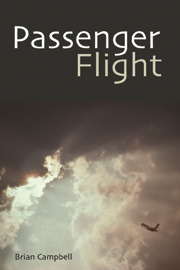
About the book
About the author

Montreal-based poet, singer-songwriter, editor, and translator Brian Campbell is the author of Guatemala and Other Poems (1994) and Undressing the Night (2007), a translation of the selected poems of Nicaraguan-Canadian poet Francisco Santos.
His poetry, reviews, and essays have appeared in literary magazines such as The Antigonish Review, Vallum, CV2, The New Quarterly, Grain, Prairie Fire, Rock Salt Plum Review, The Rover, and The Saranac Review. A finalist in the 2006 CBC Literary Award for Poetry, he is also the co-founder/editor of Sky of Ink Press, which prints quality chapbooks by emerging poets. His independent music CD, The Courtier’s Manuscript, was released in 2002.
Excerpt
SPOILS
I sit on my aluminum throne. This spruce and eucalyptus-veneer table was shipped especially from Malaysia. These teak-stained tablemats, Sri Lanka. On that ersatz cherrywood shelf (Bengal), dates from Iran, mandarins from Morocco, gala apples from Chile. This neoprene book in which I draft is from Mexico; the power cord, straight from China. The robe I wear is from Taiwan.
I am the Emperor. As I cross my kitchen (five steps) to lie on my Swedish bed, I hear the murmur of voices around my head. Such gentle hands, the servants that bear me aloft! I have every reason to trust them. But I have my spies, my plants. And now I’m told of whispered connivery: plans to poison, surprise me with a dagger, a well-timed bomb.
Poison, dagger, bomb: they have been planning it night and day, for decades. They meet via satellite, speak to each other through networks in the sky. They wear fezzes, turbans, polyester neckties. They pray to the One True God. I have never seen the One True God, although I have looked everywhere, in my closets, in my drawers, among my genitals, beneath my toenails. I am told my sin is grave. They plan infernos for every single portal of my world.
But: I am the Emperor. I sit on my plastic throne. In this nine- by eleven-foot kitchen, I am surrounded by a collection of clocks. Every day, new clocks come in the mail, direct from Pakistan, Viet Nam, Yemen, Venezuela. Invariably they say thirty-two seconds to … is it noon, or midnight? Invariably, I wind them back, synchronize them with the others. Clocks are crucial. Clocks are indispensable. I am the Emperor of Time: I control it from this Indonesian table, this German throne.
SLOUGH
Everything under a thin skin of dust. In the stillness it falls like snow. Beautiful, this falling. Soon I will be a part of it: accumulate on other bodies; as they move, they’ll shed my presence. We are all shedding presences of the dead. I shake a glass globe: a flaked storm whirls and settles. Shake again: multitudes in feathery whiteness. Galaxies are inhaled and exhaled with every breath.
EYES
Eyes peer in at me, in dreams, in crowds. Eyes look up from desks, around edges of partitions. Eyes bear down at me, in corridors, washrooms, department stores, subway tunnels. Electronic eyes in walls record my every movement. Camera eyes track my vehicle, issue tickets in my name. At the border, a lens records my iris; another images my voice. I pay for this: a surtax, to keep me safe. How did I, supernumerary, become so important? But in my insignificance is danger: they imagine I must seethe in fury, have live ammo strapped to me, readied to explode. And indeed, tucked within me like a dagger, I do have that fury: I too am a digital camera, recording their transgressions. Even as I type, at midnight, in this cottage in the country: scuffle, scratch: a masked face, cloaked spy at the window. Hey! I shout. Raccoon.
BEHIND THE EYELIDS
Behind the eyelids are layers of paisley, a shifting, breathing Persian carpet. Rectangles form, spread, dissolve. Rows of granules become spuming waves, meshes that sway in an ocean current. Networks of veins, patterns of leaves. Now crepuscular darkness brightens to orange, becomes sun behind fog: I grope through a room, touch a warm lampshade; slide my hand along a wall.
FISHY
The poetry editor of a magazine to which I had recently submitted sent me an e-mail asking permission not to print my poems, but to kindly let him grind them up into fish food. “In our aquarium,” he explained, “we have several exotic fish, and we are of the opinion that your poems, ground up, would make an ideal nutrient for them.” “Will you eventually publish them?” I wrote back. “No, we’re afraid your poems, however worthy they may be, do not meet our editorial needs at this time.” “Will I be able to publish them elsewhere?” was my next question. “Only,” he replied, “if the publisher agrees to print them with this credit underneath: – Originally ground up as fish food for The Barracuda Review. However,” he added, “we also think that your poems, grated, might serve as an excellent condiment for Italian food. If you agree, we’ll try them on our Fettuccini Alfredo tonight.” Reflecting on this, I realized it’s true: poems don’t have to be read to be appreciated. I accepted his offer, although not without feelings of regret and chagrin.
BLOWZE
drowsy blowzy, a great blouse of clouds. ethereal undulations, gaseous deeps. down there, in feathery canyons, my limbs melted. I am faint of oxygen. no birds: only flight. tufts, tawny sunlight. whorls, white. all circular, framed in this transparent bubble. and the serpents in my eyes, in my milky brain, hiss, writhe as their blood turns to vapour at this height. such a wonderful flying machine: scarcely audible the engine’s purr. I have only just awoken. I hurtle past in the huge luge of my craft.
Reviews
“In Passenger Flight Brian Campbell finds the boundary between music and language in a re-invention of the prose poem. The poems speak as if translated from a “Cyber Sutra,” a dream of the near future. We should listen. ” >>
— Maurice Mierau
“The title of the final book reviewed here, Passenger Flight by Brian Campbell, suggests movement without commitment to any particular place. The book’s epigraph is from Baudelaire’s Spleen of Paris, and Campbell’s work engages formally with Baudelaire’s famous sequence of…” >>
— Aaron Giovannone Canadian Literature
“These prose-poems are wonderful: smart, allusive without pretension, eloquent, varied in technique and tonal register, and, in places, wildly funny. "Fishy", for instance, is hilarious, a piece that should spread microbially among other poets and fiction writers, much as did…” >>
— Steven Heighton
“Urbane, captivating, Brian Campbell’s images are as vertical as the city he describes and the sky overhead. Often blackly humorous, he records the frustrations and celebrations of ordinary living, juxtaposed to a time-space immensity which can only overwhelm and defeat.…” >>
— Heather Spears
“In this gem of a collection, Brian Campbell uses every device available within the poet’s armamentarium—except the line break. This allows Campbell’s somewhat eccentric persona to speak with manic breathlessness as his 'one open eye' explores the 'flexuous' possibilities of…” >>
— Maxianne Berger
“Brian Campbell's Passenger Flight is a collection of prose poems about very contemporary concerns: the depiction of women in advertising, big-city life, sex tourism, high blood pressure and global commerce. One poem, Pastorale, uses language from postings at an abandoned…” >>
— Uptown Magazine
“The long and short of the prose poem is that it’s a product of deep inner contradictions. Its prose wants the freedom to wander, while its poetry wants the brevity of a few luminous words. It rejects the primacy of…” >>
— Rover
“Brian Campbell’s prose poems are epiphanies – discoveries of transcendent meaning in the context of the everyday. Herein is philosophy as play, social critique as wit, and wisdom as awe. ” >>
— George Elliott Clarke








 Back to top
Back to top